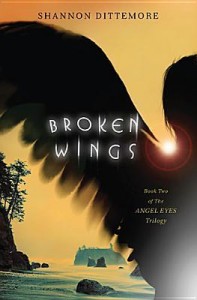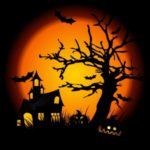Speculation And Biblical Elements
 The Christian Science Fiction and Fantasy Blog Tour (CSFF) is currently featuring Broken Wings, Book 2 of the Angel Eyes triology by Shannon Dittemore. I haven’t had time to read the first round of posts yet (those that went up first thing on the east coast), but there are a few article titles that make me think there may be some discussion about how Biblical this Christian speculative fiction is.
The Christian Science Fiction and Fantasy Blog Tour (CSFF) is currently featuring Broken Wings, Book 2 of the Angel Eyes triology by Shannon Dittemore. I haven’t had time to read the first round of posts yet (those that went up first thing on the east coast), but there are a few article titles that make me think there may be some discussion about how Biblical this Christian speculative fiction is.
In the January tour earlier for Angel Eyes, Book 1 of the series, there seemed to be a consensus that the story did not contradict what the Bible says about angels in particular, though it included some speculative material that was … well, speculative.
I thought at the time, And isn’t that the way it should be? After all, I’ve written here in this space that Christians can enjoy a greater degree of imagination because we stay within the parameters Truth creates. It may seem counterintuitive, but nevertheless, I believe this to be so.
In fact, just this past Saturday, my writing group got together, and at one point we began discussing the angelic beings which both Ezekiel and John describe. Here’s the fairly lengthy account, and if you’re not familiar with it, I encourage you to read it in its entirety, because you won’t find anything more otherly in all the Bible, I don’t think. We’d call this speculative literature, but it’s the best Ezekiel could do to describe what he saw, not what he imagined.
As I looked, behold, a storm wind was coming from the north, a great cloud with fire flashing forth continually and a bright light around it, and in its midst something like glowing metal in the midst of the fire. Within it there were figures resembling four living beings. And this was their appearance: they had human form. Each of them had four faces and four wings. Their legs were straight and their feet were like a calf’s hoof, and they gleamed like burnished bronze. Under their wings on their four sides were human hands. As for the faces and wings of the four of them, their wings touched one another; their faces did not turn when they moved, each went straight forward. As for the form of their faces, each had the face of a man; all four had the face of a lion on the right and the face of a bull on the left, and all four had the face of an eagle. Such were their faces. Their wings were spread out above; each had two touching another being, and two covering their bodies. And each went straight forward; wherever the spirit was about to go, they would go, without turning as they went. In the midst of the living beings there was something that looked like burning coals of fire, like torches darting back and forth among the living beings. The fire was bright, and lightning was flashing from the fire. And the living beings ran to and fro like bolts of lightning.
Now as I looked at the living beings, behold, there was one wheel on the earth beside the living beings, for each of the four of them. The appearance of the wheels and their workmanship was like sparkling beryl, and all four of them had the same form, their appearance and workmanship being as if one wheel were within another. Whenever they moved, they moved in any of their four directions without turning as they moved. As for their rims they were lofty and awesome, and the rims of all four of them were full of eyes round about. Whenever the living beings moved, the wheels moved with them. And whenever the living beings rose from the earth, the wheels rose also. (Ezekiel 1:4-19)
In part those of us discussing these descriptions were trying to understand what it was Ezekiel saw, but we were also speculating about our reaction. In Heaven will we have the same kind of fearful awe that make Ezekiel fall on his face or made John act as a dead man? In other words, we were wondering what it would be like to see the supernatural.
And guess what the Angel Eyes series is about? In essence it’s asking what a contemporary teen sees when she’s given the gift of viewing the supernatural.
In fact, the epigraph in Book 1 is a quote from 2 Kings when Elisha, in a city surrounded by an enemy army, told his servant not to be afraid because those with them were greater in number then those opposed to them. He then prayed that God would open the servant’s eyes. As a result, the man saw “horses and chariots of fire” filling the mountain.
Apparently Elisha had “angel eyes” and could see these supernatural forces all along, but the servant, in answer to prayer, had a moment of clarity when he could see beyond the veil of this mortal existence.
My point is this: Seeing the supernatural is Biblical though it is far from common. So why not read stories that speculate what might happen if someone today could see the way Elisha did, or at least the way his servant did?
As I may have said before, I’m generally not a fan of angel and demon stories, largely because the ones I’ve read have places that contradict Scripture. Those bother me as much as historical fiction does when it strays from the truth. OK, more. I don’t like writers tampering with the truth.
 But is speculating, “tampering with the truth”? I don’t believe so. If Scripture is silent–and it is to a large extent when it comes to the spiritual warfare raging in the heavens, the kind Michael told Daniel had caused the delay to the answer to his prayer–then are we forbidden from wondering what that looks like?
But is speculating, “tampering with the truth”? I don’t believe so. If Scripture is silent–and it is to a large extent when it comes to the spiritual warfare raging in the heavens, the kind Michael told Daniel had caused the delay to the answer to his prayer–then are we forbidden from wondering what that looks like?
In truth John Milton did much the same, but I suspect that fewer and fewer people are reading Milton these days.
But what about angel books that are entirely fanciful, that create, for example, a world in which angels can be trapped on earth and end up marrying humans? Such fanciful stories are as factually accurate in painting angels as the Harry Potter books are in painting Biblical witches and wizardry.
If we say, no, we ought not to speculate about Biblical realities, does that mean we ought not to speculate about humans, too, since we also are Biblical?
Here’s how I resolve all this–see what you think. If a story includes supernatural beings and treats them as real, they ought not contradict Scripture, which does not mean the story cannot speculate about things unknown. However, if the story includes supernatural beings in a fantasy world with no attempt to align them to the beings which appear in Scripture, then there is no “contradiction with Scripture” since there is no aligning with Scripture. In the same way that “Mr. Toad’s Wild Ride” doesn’t contradict Scripture, neither would a story about make-believe angels.
Clearly the Angel Eyes trilogy falls into the former category. The angels and demons are treated as actual, real creatures, but they do not contradict what little Scripture says about angels and demons. In fact, if anything, they make the unseen spiritual activity seem present and powerful and part of what’s happening in the here and now.
But I’m interested in your thoughts. What was your reaction to Angel Eyes or Broken Wings or any other story that you’ve read with angels and/or demons? What’s your reaction to the way I resolve stories that include supernatural beings?









































I agree. I’m on the umpteenth draft of my manuscript which involves in part angels and demons and the fall of Satan. There is a blurred line between speculation and what we know. The challenge is keeping even the speculation theologically sound.
Good for you, Jeff. I think that must be one of the hardest lines to walk, but if fiction is about truth, then I think it’s necessary. I know Shannon Dittemore, for the most part, pulled it off, and it made the story much richer and true because of it.
Becky
This is why I am giving the drama Supernatural a wide berth. They present demons who were once humans, angels who possess people, and God disappeared ages ago.. all of which would be suspicious in a fantasy world, but is heretical when set in ours.
I’m with you, Galadriel. I don’t care at all for a story about the supernatural told from a non-biblical worldview. What would be the point? They can’t reveal truth unless it’s a negative–by omission, it proves what is true. I believe this came up in some of the comments to Donita’s Friday post. But that’s not the type of story I gravitate toward, that’s for sure.
Becky
I like the way you look at it, Becky. I feel much the same way.
I really enjoyed Shannon’s “Angel Eyes” (looking forward to reading “Broken Wings”), and much because of how she handled the spiritual world. It was biblical enough that it resonated with what I know to be true, yet she introduced speculative elements that made things interesting and opened my imagination. I felt a thrill reading her story that I hadn’t felt since my early days of reading fantasy, a sense of “anything is possible” or “what if that happened to me?” that I hadn’t felt for a long time.
It’s also such a freedom to be able to create our own worlds, our own rules, for when we (as Christian authors) want to explore something that just wouldn’t be biblical in our world. If we want the fun of writing a story where un-Biblical things happen to people or where different rules apply to spirit beings than we understand in our universe, we can create a whole new universe to house those ideas and to tell that story!
Seems to me that we can have the best of both worlds. And I personally believe that I have a responsibility to stick to the truth when writing “real world” stuff. I don’t want to be responsible for misleading people. I don’t want them to think that angels take possession of humans if they don’t. Or to think that demons can be saved if they can’t. Or whatever.
On the other hand… What would you call a story that takes place in the modern world but contains fantasy elements, such as vampires or werewolves? Do the biblical rules apply or not?
In that case, would we treat humans and angels Biblically while “any rules we want” would apply to the vampires and werewolves? Or would we apply the rules that apply to humans (ie, they have souls that can be saved or damned to hell) to the humanoids of the story?
I think that’s where it can get tricky. I deal with that by handling my vampires and werewolves as humans who are affected by viruses, genetic disorders and supernatural influence (demonic oppression/possession). But I wonder how others approach it?
Thanks, Teddi.
Again, I think the comparison with Harry Potter is helpful. Those stories took place in this world, but the fantasy part of it, passing from the regular world into the magical world by walking through a brick wall, allowed the reader to consider everything from that point on as imaginative.
For werewolves and vampires, since they are imaginary creatures, I don’t think there are hard and fast rules (they can’t be redeemed, they have to be evil). Even dragons. Yes, the Bible mentions the dragon in Revelation in relation to Satan, but because we don’t have dragons here today, it’s fine, I think, to create minor dragons or meech dragons or riding dragons, as Donita Paul did, or to make them malleable creatures God wishes to save, as Bryan Davis did.
Becky
Angels and demons are hot right now, and I’m starting to encounter them more and more in fiction. Really it boils down to the story world’s rules. Are they biblical angels? Then I expect the author to follow biblical rules. Is it something else entirely, like Devil May Cry, or Daughter of Smoke and Bone, or Evangelion? Then I expect it to adhere to its own rules and leave the Bible alone.
If an author can mix and match their mythologies with the Bible and still pull it off–like the Dresden Files– then I’ll read along for the sheer entertainment value. He does vampires, werewolves, the Fay, God, archangels, Odin, you name it. And somehow it just works. (He writes God with the utmost respect and none of the other supernatural beings like Him much.)
Cool, Kessie. That’s a good point. Just because someone is writing about angels and demons doesn’t mean they’re biblical ones. Sometimes it’s more of a “mythological” approach.
Intriguing mention of the Dresden Files. I’ve heard of it, maybe even seen some illustrations (is it a graphic novel?), and now your description makes me think I should take a look at that one.
I’ve read Dresden Files (can’t remember which ones) but some of the dreams I had afterwards spooked me on a spiritual level, so I dropped them. I don’t think they’re bad–loved Micheal–but I just feel better staying away from them.
Evangelion though defies this whole topic entirely. It has so many layers and uses a lot of Christian symbolism as well as kabbalistic myth that even if you get the rules I think it can still hit you hard. I don’t think any Christian would think about the Rapture the same way twice after watching the End of Evangelion, separate rules be darned.
Good point! And really, regardless of what rules an author is or isn’t consciously following, there’s always the potential for a story to hit on truth or to hit nerves that resonate profoundly.
Makes me want to watch Evangelion again. I don’t think I was paying attention to the Christian symbolism and such when I was watching it before (years ago).
[…] I’ll also mention that I too used Broken Wings as a jumping off point in my article today at Spec Faith. […]
Whether angel or demons enter my script, my fiction compulsion requires me to ask – what if? What if, for example, an average John Doe couple suddenly realized that Ephesians Six is right on, that angels and demons fight over them, one for light and grace, the other to kill, maim, and destroy.
What if that same couple found they could tap into the ability to ‘see’ angels and demons or at least recognize events shaped by those entities. What would you do? The focus of the answer to that writing is caused by a general question I have about our nation and the spiritual direction it is taking? It seems, although it might not be true, that most people away from church friends, etc. that God isn’t relevant in any way. What would God need to do to stop our society and make them know ‘He Is God’ ? That the great ‘I AM stands for light and truth, opposite of our society in general.
If our original couple suddenly became aware of spiritual battles and suddenly knew of great impending danger as God is about to strike this nation down with multiple natural disasters, would that wake people up. It sure makes a great series to write. I know that. I’m thinking more people might be made aware if more scripts chose elements of these proportions. What might you think?
You guys all rock. I love that we have a place where we can discuss these things in a gracious friendly forum. To those who have shared kind words about my books, THANK YOU.
Rebecca, reading your post, I think you should really give my fellow Crimson Moon Press author JC Lamont’s PROPHECY OF THE HEIR a try. (Not trying to plug here, it just seems very much up your alley.)